by Daniel Mallock (October 2018)
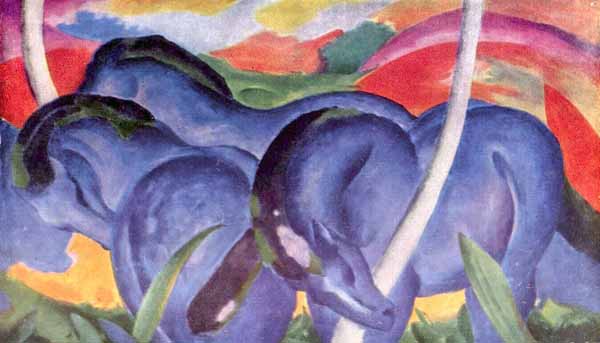
Two Blue Horses, Franz Marc, 1911
Concluding his Second Inaugural address a month before his assassination, Abraham Lincoln set the divided country on two paths: victory, and healing. “With malice toward none, with charity for all, with firmness in the right as God gives us to see the right, let us strive on to finish the work we are in, to bind up the nation’s wounds, to care for him who shall have borne the battle and for his widow and his orphan, to do all which may achieve and cherish a just and lasting peace among ourselves and with all nations.”
Those who bear the burden of the nation’s battles themselves need support, compassion, and a road to personal empowerment and recovery from whatever physical or spiritual wounds they’ve suffered. Our military members, emergency personnel, and first responders are our heroes. When they hurt so do their families.
The Veterans Administration has Lincoln’s words on their buildings and as their motto—his mandate is their mission statement: “To care for him who shall have borne the battle and for his widow, and his orphan.” This fundamental duty of the nation to its most extraordinary and courageous citizens is augmented by private Americans whose important and valuable work provides support and compassion, guidance, love, and hope to our warriors. One of these exceptional people is Jennifer O’Neill.
In the latter part of September, NER’s Managing Editor, Kendra Mallock, accompanied by me, visited with Ms. Jennifer O’Neill, noted American model, actress, producer, author, humanitarian, wife, mother, grandmother, and expert equestrian. Now in her 7th decade Ms. O’Neill, herself a survivor of trauma and personal anguish, is dedicated to helping others—specifically those service members and first responders (and their families) who suffer from PTSD. Helping America’s heroes who have borne the battle to truly come home is one of several missions to which she has dedicated herself.
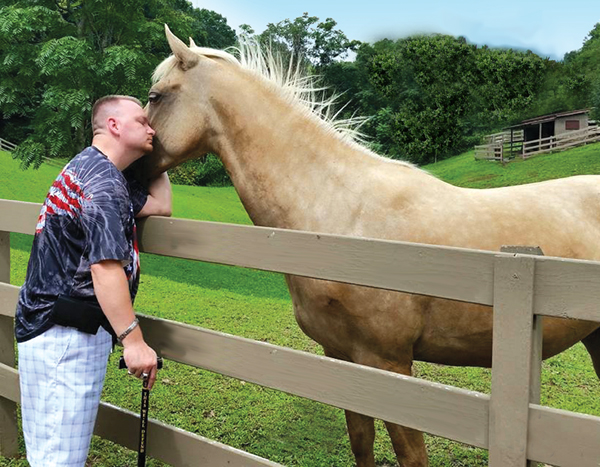 Soldiers and first responders dedicate their lives to the service of others and to the nation; they embody one of the foundational Christian principles that there is no greater love than laying down one’s life for a friend. They sacrifice every day to keep the country safe and give protection, love, support, and care to their countrymen; there are those too few who return the favor.
Soldiers and first responders dedicate their lives to the service of others and to the nation; they embody one of the foundational Christian principles that there is no greater love than laying down one’s life for a friend. They sacrifice every day to keep the country safe and give protection, love, support, and care to their countrymen; there are those too few who return the favor.
Ms. O’Neill and her friends, supporters, and colleagues at Hope and Healing Hillenglade in Nashville, Tennessee, provide an equine-assisted program that gives new hope and healing to our heroes who suffer from Post-Traumatic Stress Disorder (PTSD). Suffering is not a solitary matter—their families are also deeply affected.
It is an unhappy truth that not only those who serve our country in the armed forces and as first responders are potential victims of PTSD; any military service member (active or veteran) and first responders, and their families, are welcome at Hillenglade (whether they suffer from PTSD or not) free of charge. US military personnel, first responders and their families can come to Hillenglade to “enjoy time in the country and the therapeutic wonder of horses.” Hope and Healing at Hillenglade also offers retreat healing sessions and family celebration events for our military heroes, first responders, and their families. Reservations for these events and sessions are required.
Referral from USO, Veterans Administration, and associated programs is required to attend therapy sessions at Hillenglade. All attendees must be referred by associated programs.

We arrived at the farm and retreat early in the afternoon to chat with Ms. O’Neill about Hillenglade and an upcoming fund raiser to be held in Franklin, Tennessee on November 3, 2018 (more on that later). .jpg) We were met at the door of her modest but comfortable (and entirely unostentatious) Tudor-style home on the rural outskirts of Nashville by a smiling cowboy-hatted, bandana-wearing Jennifer O’Neill in denim and boots, looking very much like the horse-loving person that she has long been. She launched her modeling career at the age of 15 with a visit to the Ford Agency in New York City for the express purpose of earning enough money to purchase her first horse.
We were met at the door of her modest but comfortable (and entirely unostentatious) Tudor-style home on the rural outskirts of Nashville by a smiling cowboy-hatted, bandana-wearing Jennifer O’Neill in denim and boots, looking very much like the horse-loving person that she has long been. She launched her modeling career at the age of 15 with a visit to the Ford Agency in New York City for the express purpose of earning enough money to purchase her first horse.
We all sat together in her sitting room/library where Ms. O’Neill had graciously set out coffee, crackers, and cheese. I opened my notebook and ominously informed Ms. O’Neill that I had brought 31 questions all organized by subject: Hope and Healing at Hillenglade, Modeling, Christianity, Marriage, Hollywood, Nashville, Abortion, and Social Media and Meaning. Then transpired several hours of conversation during which time I got to ask perhaps two of my prepared questions. This is not to say that the interview was a failure; it just went in, out, all around and back again in a perfectly natural, freely flowing, honest, and friendly conversation rather than align to a more formal/rigid format. That most of my written questions were answered either directly or indirectly (without my having asked them) was perhaps more ironic or coincidental than any indicator of this interviewer’s question-making skills. The interview hadn’t failed at all.
When a person of intelligence, beauty, talent, accomplishment, and depth determines that the course of her life ought to change—it will. In Ms. O’Neill’s case her life did change because its focus changed. Ms. O’Neill is certainly a warrior—the motto of Hillenglade is their mission statement: the need to serve is great. She is a warrior who supports our American warriors.
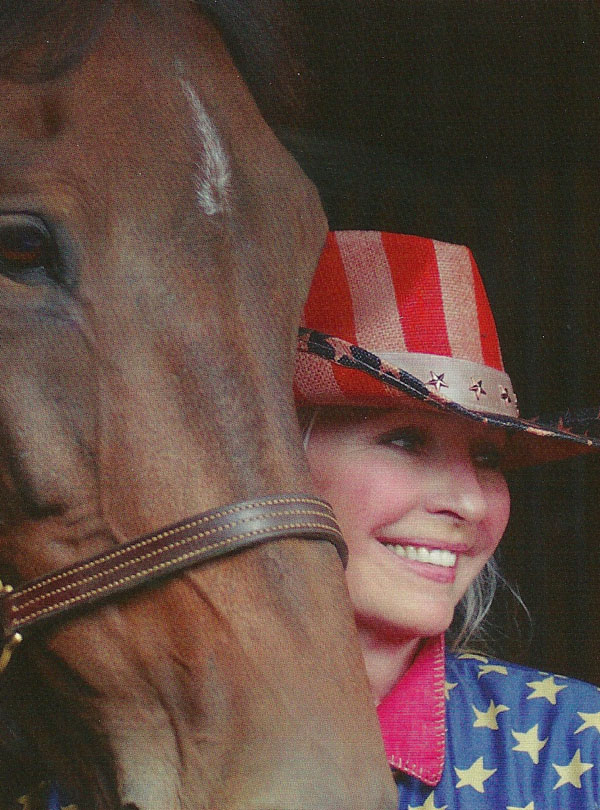 Considered one of the most beautiful women in the world, an actress of note (38 feature films and television series), model (30 years as Cover Girl’s cover girl), author (Surviving Myself), producer, and now activist and champion for military and first responder sufferers of PTSD who so dearly need aid, Ms. O’Neill’s extraordinary resume of accomplishment is now in a new phase. Having survived more than several close calls with death, she is a true champion for life.
Considered one of the most beautiful women in the world, an actress of note (38 feature films and television series), model (30 years as Cover Girl’s cover girl), author (Surviving Myself), producer, and now activist and champion for military and first responder sufferers of PTSD who so dearly need aid, Ms. O’Neill’s extraordinary resume of accomplishment is now in a new phase. Having survived more than several close calls with death, she is a true champion for life.
Ms. O’Neill is not shy about her strong Christian faith; she is not shy at all, too, in sharing her stories of failed marriages, mistakes made, and an abortion at age 19 that covered her with self-loathing and despair. She does not tell these stories due to any morbid fascination with her past, but as an instructive, cautionary guide to others. Ms. O’Neill came to Christianity in her late 30s (though believers would certainly say that no age is too late) and enthusiastically describes her beliefs and her love for Jesus Christ; she is like so many Christians whom I am very honored and happy to know personally. Enthusiasm for Jesus and for the power and promises of Christianity are almost universally seen among them; these are defining traits. When she publicly declared her Christian beliefs at the age of 38, Ms. O’Neill said that the response from Hollywood was to “blackball” her.
As a Christian, Ms. O’Neill is a defender of the not-yet-born and a great opponent of abortion. Her appearances at anti-abortion events and in support of like-minded organizations are easy to find on the internet. She is a defender of life, as any lover of life ought to be.
For any caring, moral, person the destruction of innocent life is a great sin—one does not need to be a Christian to know that this is so—it is an essential American, and human, truth. Ms. O’Neill champions a moral truth that most Americans, Christian or not, once widely understood and accepted as fundamentally correct. This is, sadly, no longer true.
John Adams wrote this to the officers of a Massachusetts regiment during the conflict with revolutionary France, later known to history as the “Quasi War,” in October, 1798:
Our Constitution was made only for a moral and religious People. It is wholly inadequate to the government of any other.
The strident obsession of the progressive American left with defending and justifying abortion, characterized most recently by Mrs. Clinton as nothing other than a “woman’s health care decision” that must be upheld by Democrats, is a direct challenge to Adams’s concepts about morality and the nature of our country. It may not be advisable, or even possible, that we legislate any further on this morally and ethically clear but, never-the-less, contentious matter.
John Adams’s message was that we want and need to have a society and country populated by people who will make the right moral choice whenever possible, not the most convenient or ego-centric choice. Our American constitution was built on the expectation that such would be our citizenry; that it is not signals an essential crisis in the American revolutionary experience.
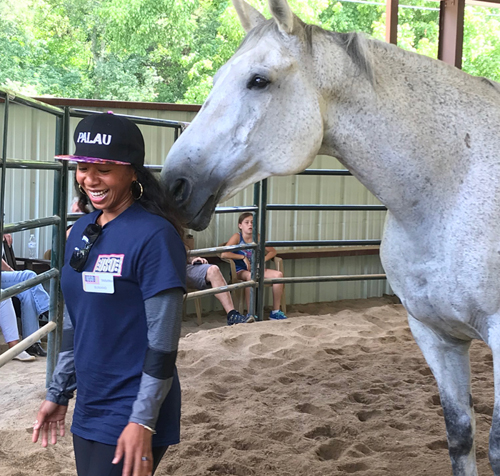 Central to Ms. O’Neill’s ongoing battle against unmeaning and confusion is fostering a sense of value, importance, and belonging. One of the appalling aspects of PTSD is that it isolates the sufferer from him/herself as it also does from their families and community. It imbues a profound sense of internal suffering, frustration, isolation, and often uncontrollable anger even to violence. This disconnectedness from self and others that is so classically associated with PTSD and other ailments of the spirit can be directly challenged and ameliorated with equine therapies—as proven since the 1980s with the successful treatment of warriors in Israel.
Central to Ms. O’Neill’s ongoing battle against unmeaning and confusion is fostering a sense of value, importance, and belonging. One of the appalling aspects of PTSD is that it isolates the sufferer from him/herself as it also does from their families and community. It imbues a profound sense of internal suffering, frustration, isolation, and often uncontrollable anger even to violence. This disconnectedness from self and others that is so classically associated with PTSD and other ailments of the spirit can be directly challenged and ameliorated with equine therapies—as proven since the 1980s with the successful treatment of warriors in Israel.
Working with horses demands from the human a level of connectedness with the animal, a sense of groundedness and being-in-the-moment. It is a way to focus attention and mental energies in trust-building, communication, and cooperation exercises. The great animal, large, powerful, and potentially dangerous demands a sense of trust and involvement from the human in order to make the horse/person relationship work. These skills of trust-building and of self-control are essential in bringing the sufferer out from the pain and darkness of him/herself and back to the wider world of others and of happiness itself. Taming the power of the horse and creating a cooperative relationship with the animal, an animal often weighing a thousand pounds or more, demands a level of engagement and involvement that is directly contrary to the internal darkness and disconnectedness that comes with PTSD. Working with horses helps the sufferer to help themselves by learning through action about patience, triggers, control, and compassion.
In one case, an unhappy young lady came to Hillenglade; Ms. O’Neill described her as a “storm.” Unable to bridle her mare, and full of frustration and rage, the young lady directed her anger at the horse, “You stupid horse! Why won’t you follow me? She went with everyone else!” Observing this, Ms. O’Neill said to the young woman, “Well, would you go with you?” This direct question had its intended effect with a wave of self-awareness crashing over the young lady who, later, became a well-adjusted woman and great friend to the farm.
In reading any biography of Ms. O’Neill her many marriages (9 marriages to 8 different men) are difficult to avoid. She is not averse to discussing these and other subjects of a very personal nature. Of her marriages she quips that she’d been “looking for love in all the wrong places.” Now, she is married to Nashville native, Mervin Louque (owner of Douglas Corner Cafe), for over twenty years—her painful, troubled search for love apparently successfully concluded.
Of her father, Ms. O’Neill described him as a “war hero who spoke 5 languages.” A B-17 pilot in World War Two, he was shot down over Germany during his second to last mission. He ended up a POW for two years in the same German prisoner of war camp made famous by the “Great Escape.” After his release he returned to London where he met his wife (Ms. O’Neill’s mother). At that time, PTSD was not understood and went undiagnosed. Her father’s occasional rages and disconnectedness from others suggested to her that he had PTSD.
Two American funerary presentation flags proudly displayed in their austere triangular cases attested to Ms. O’Neill’s personal association with veterans and with loss. One of her husbands was a Vietnam War Marine Corps veteran—he, too, suffered from PTSD. He is 100% disabled from its ravages.
In a discussion of her experiences in Hollywood, Ms. O’Neill opened the subject with happy reminiscences of working with John Wayne on “Rio Lobo” (1970). She was “surprised” then at how “kind and professional” he was, and that working with him on that movie had been a pleasure. She recollected seeing the actor Lee Majors often at their studio’s commissary. At that time, film actors (her) rarely did television work (him). Ms. O’Neill admitted to being unfriendly toward Mr. Majors on account of the film actors’ view that their medium was superior to television. Only after she began working on the television series called “Coverup” did she realize how difficult a television actor’s life was in comparison to that of a film actor. She apologized to Mr. Majors telling him that she had had no idea at all how difficult things for television actors actually were. She explained that it was the television mini-series “Roots” which first broke down the wall between film and television. Prior to “Roots” film actors considered television work a significant step down.
Talk of television and film brought Ms. O’Neill to a comparison of Christian-oriented films versus Hollywood films. She noted with concern the comparative lack of quality in Christian films as a simple lack of sufficient budget. She cited “Cider House Rules” (1999) as an excellently produced and acted movie but one with a negative, pro-abortion message. “Such films have never been effectively countered by those with a life-affirming message, due to lack of funding and filmmaking excellence,” she said. Ms. O’Neill mentioned that the fragmentation of the Christian community into denominations has prevented a unified approach in the war for life. Bringing different groups together in this fight is another of her ongoing efforts to oppose the cruelty and devastating moral confusion of abortion. She added, “In understanding the incredible impact of media and journalism we should counter the abortion message with life-affirming films of excellence, because we do not serve a ‘dollar-ninety-eight God’.”
We discussed a recent study that showed that young people who are heavy users of social media are more lonely. Ms. O’Neill noted that young people are now over-stimulated and have little time for focused thought and work involving concentration. She noted that the constant input of social media, texting, and ceaseless availability for sending or receiving messages prevents people from gaining a sense of connectedness with nature, a feeling of groundedness, and active, true involvement with life’s rhythms. With a smile, Ms. O’Neill added that horses can help.
“God was in a good mood when he made horses,” she said. “Did you know that horses have 17 different readable expressions—more than a monkey has?

We are in the midst of a national tragedy as evidenced by 24+ suicides daily among our military, as well as alarming rates of marital and family dissolution. It is a moral imperative to help our warriors and our first responders, and their loved ones. Despair and suicide are often fueled by PTSD in our veterans—addressing this critical challenge is the mission of Ms. O’Neill’s Hillenglade.
Efforts at Hillenglade to help others began in 2009 with a mothers and teen daughters program. The core of this program became the foundation of others—breaking down barriers, overcoming fear, building communication and trust, quieting the internal furies and pains of so many people in crisis and despair. These are sizable problems; the horses can help.
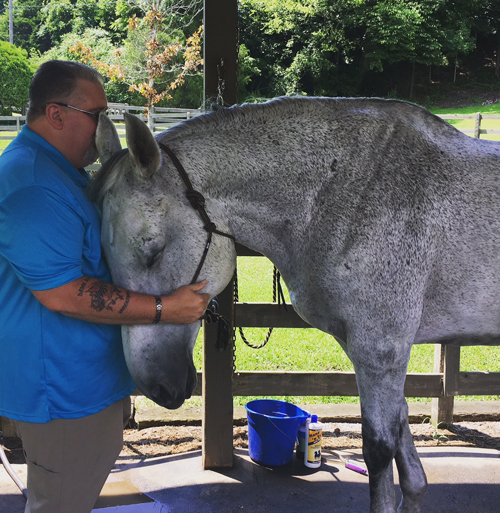
In much the same way that Alzheimer’s cruelly steals from the victim central elements of memory and even of their personality, PTSD can rob the sufferer of mental and physical self-discipline and control. This can bring rages and violence, self-loathing, despair, and suicide. Re-establishing and expanding self-knowledge through working cooperatively with horses, starting with grooming them, understanding safety values, and then “at liberty” in the round pen all helps to boost confidence, trust, and a sense of connectedness and self-mastery. Horse knowledge is readily converted to people knowledge.
Ms. O’Neill said that “there is nothing more magical than people interacting with horses.” She understands fully, from personal experience, that PTSD’s victims are not the only sufferers—their families, too, are impacted. Over 4,000 people have been helped at Hillenglade . . . so far.
She said that “horses had always been her dream, and that God had recycled it.” Ms. O’Neill mentioned Romans 8:28 several times during our visit. “And we know that in all things God works for the good of those who love him, who have been called according to his purpose.” Helping people with horses is one of the ways that Ms. O’Neill does God’s work. Combining her talents and purposes, Ms. O’Neill is working with Kathy Lee Gifford on a new film about Hillenglade expected for completion in 2019.
Those who help and support others sometimes need partners to fund and fulfill their mission.
To address the crisis of PTSD in our warrior and first responder communities, Ms. O’Neill’s Hope and Healing at Hillenglade stands as a safe and welcoming haven. The programs at Hillenglade are entirely subsidized and involve no cost to US military heroes and their families in need of help.
 Hillenglade is currently expanding their facilities to support overnight programs for warriors, first responders and their families. A fund raiser hosted by Ms. O’Neill will be held at the Franklin Theater (Franklin, TN) on November 3rd at 7:30 pm with performances by the Righteous Brothers and Kathy Lee Gifford.
Hillenglade is currently expanding their facilities to support overnight programs for warriors, first responders and their families. A fund raiser hosted by Ms. O’Neill will be held at the Franklin Theater (Franklin, TN) on November 3rd at 7:30 pm with performances by the Righteous Brothers and Kathy Lee Gifford.
Ms. O’Neill began her extraordinary career at the age of 15 so that she could own a horse. Now, she is building a superb new chapter in her story. Emerging from years of self-doubt and personal pain she is now a confident, happy, and dedicated woman giving back in a way that is both rare, and critically important to so many. It is not an odd thing at all to say that on the back of a horse she and many others find a sense of connectedness and satisfaction. We are all part of a greater whole; horse and rider, horse and person, is an archetypal relationship of cooperation and power.
Our visit with Ms. O’Neill concluded after several hours. We toured the farm and met the ten horses and “donkeyettes” (as Jen prefers to call them) who live there, and saw the impressive new overnight facilities now under construction. Hillenglade is quiet and peaceful, with rolling hills and beautiful scenery. It is a place to go to collect oneself, to find oneself again if something has been lost and thought irretrievably gone. The horses are there to help people reconnect with themselves and others, to find again what they’ve lost.
When 9/11 happened, and at every act of terror atrocity since then, witnesses run toward the site of the carnage/gunfire/knifing/explosion/vehicle crashes to render whatever aid they can to the wounded. Such a reaction has been classic throughout American history—we tend to run toward the danger rather than in the opposite direction. This combination of courage and compassion is a foundational element of the American character.
In our world of crisis, of challenge, of sacrifices and loss, there must be havens—places to go for healing, compassion, and a renewal of the spirit; Hope and Healing at Hillenglade, on the outskirts of Nashville, is one such place. Its founder is Ms. Jennifer O’Neill, accomplished equestrian, actress, model, author, champion for life, and one of the most beautiful women in the world, inside and out.
If we look around it is readily clear that we live, too, in a world of heroes. We keep our heroes close to our hearts and give them succor whenever it is within our power to give. There are many in need, and the need to serve is great.
Abraham Lincoln in his Second Inaugural address, delivered near the end of the Civil War in the midst of war and tragedy, called for a national effort to bind up the nation’s wounds. In our own time the mandate remains.
Such efforts of healing and renewal are both great and small. Sometimes, it’s just a person and a horse.

Jennifer O’Neill Ministries is a 501 (c) 3 organization since 2004 which includes the equine outreach programs offered at Hillenglade. Difficult challenges that face many Americans are addressed in Ms. O’Neill’s extensive network of support including domestic violence, sexual abuse, abortion, teen suicide, and family dynamics. There is great need, and the need to serve is great. Please contact the staff at Hillenglade for more information about these programs by clicking this link.
Please visit Hillenglade.org to learn more about Hope and Healing at Hillenglade.
_____________________________
Daniel Mallock is a historian of the Founding generation and of the Civil War and is the author of The New York Times Bestseller, Agony and Eloquence: John Adams, Thomas Jefferson and a World of Revolution. He is a Contributing Editor at New English Review.
NER on Twitter @NERIconoclast







